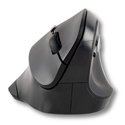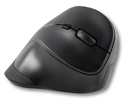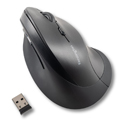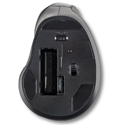| Additional Resources Usage Tips Accessories | | Product Summary |
|---|
The Kensington Vertical Wireless Mouse angles the hand outwards towards a semi-vertical position in an effort to reduce pronation. A short flange keeps the side of the hand clear of the surface but still permits most of the little finger to make contact during movement. This wireless mouse is contoured specifically for right-handed use and operates plug-and-play. However, optional drivers are available for both Windows and Mac OS should one desire to customize the button functions. A convenient DPI switch accommodates quick access to five DPI settings (800, 1200, 1600, 2000, & 2400) to accommodate different work requirements. The wireless receiver has a 10 metre range and can be stored in the underside of the mouse to ensure it isn't misplaced. The traditional scroll wheel is clickable.
The size of this mouse means it is best suited for smaller or average sized hands. The body is narrower than most vertical mouse designs, which can lead to a tendency to want to "grip" the mouse which has the potential to lead to exerting unnecessary static grip force.
Note: While being identified by the manufacturer as a "vertical" mouse this angle is substantially less than most other "vertical" mousing products, the majority of which orient the hand well above 60° and therefore much closer to a truly vertical presentation. | | Ergonomic Benefits |
|---|
Reduces Pronation - The Kensington Vertical Wireless Mouse rotates the hand outwards, elevating the thumb and fingers over the angled body of the mouse. While the angle is not as significant as the provided by most truly vertical mice, it is still sufficient to significantly reduce the typical "prone" position of a traditional mouse. Learn More About Pronation.
Can Reduce the Risks Associated with Wrist Extension - The up and outward positioning of the palm counters the tendency of individuals to "plant" the heel of the hand as with a traditional mouse. As a result the wrist is able to maintain a more neutral alignment in relation to the forearm, reducing the risk of holding it in "extension" for extended periods. Learn more about Wrist Extension.
Reduces Strain on the Fingers and Elbow - The buttons are positioned so that there is no need to "hover" over them, an activity that can contribute to the development of pain and limitation to grip. Learn More About Trigger Finger. As a result the fingers are able to rest against the buttons with minimal engagement of either the extensor or flexor muscles. The partial outward rotation also reduces the strain along the forearm, reducing the risk of developing inflammation of the tendons where they attach on the outside of the elbow, commonly referred to as Tennis Elbow. Learn More About Lateral Epicondylitis.
Cursor Stability - Because the finger motion is to a certain extent directed downward towards the worksurface, there is limited tendency for the mouse to move sideways when clicking with normal force. The position of the thumb on the opposite side of the mouse exerts an additional "countering" effect.
Accurate Cursor Control - The Kensington Vertical Wireless Mouse has a multi-level sensor that is easily adjustable via the side-mounted control. This means that pointer sensitivity is easily changed when moving between different types of work.
| | Features |
|---|
- Angled Body for Improved Ergonomics: The Kensington Vertical Wireless Mouse angles the hand outwards to reduce pronation.
- Six Button Design: Standard Left and Right Buttons, a clickable scroll wheel, back and forward buttons, and a DPI selector are easily accessible.
- Five Sensor Settings: The DPI button gives quick access to 800, 1200, 1600, 2000 & 2400 DPI settings - offering variable degrees of cursor control for different types of work.
- Plug and Play Functionality: Simply plug in the receiver and turn on the mouse - it will automatically register and be ready for work in a few seconds.
- Programmable: Windows and Mac compatible drivers are available from Kensington should there be a need or desire to change the button functions.
- Convenient Receiver Storage: When the mouse is being transported or not in use the wireless receiver can be stored in a hidden compartment on the underside of the mouse. This helps to reduce the risk of a lost receiver avoids the cost of a replacement.
- Battery Saving Switch: Battery life can be optimized by simply turning the mouse off when not using for extended periods.
| | Images (Click on any thumbnail to view larger image) |
|---|

Kensington Vertical Wireless Mouse - Front
| 
Kensington Vertical Wireless Mouse - Profile
| 
Kensington Vertical Wireless Mouse - Top View
| 
Kensington Vertical Wireless Mouse - In Use
| 
Kensington Vertical Wireless Mouse - Battery and Receiver Storage
|
| | Technical Specifications |
|---|
- Depth (front to back): 4.38" (11.1 cm)
- Height: 2.74" (7.0 cm)
- Number of Buttons: 6
- Scroll Wheel: Standard Wheel, Clickable
- Default Button Functions:
Left click, Right click, Web back, Web forward
Scroll wheel button: Middle click
DPI Button: DPI Adjustment - Optical Resolution: Adjustable (via DPI button) - 800/1200/1600/2000/2400 DPI
- Drivers: Plug and Play - No Driver Required
- Programmable: Kensington Works Software, Downloadable from Kensington Website
- Compatibility: Windows, MacOS, Chrome OS
- Interface: 2.4 GHz Wireless, USB-A Receiver Dongle (included), 33' (10 metre) Range
- Power Supply: 1 x AA Battery (included)
- Warranty: 1 Year Limited Warranty. Manufacturer direct only.
- Package Contents: Vertical Wireless Mouse, 1 x AA Battery, Wireless Receiver Dongle, Documentation
| | Models |
|---|
 | | Model # | Description |
|---|
| K75575WW | Kensington Vertical Wireless Mouse |
|
|

